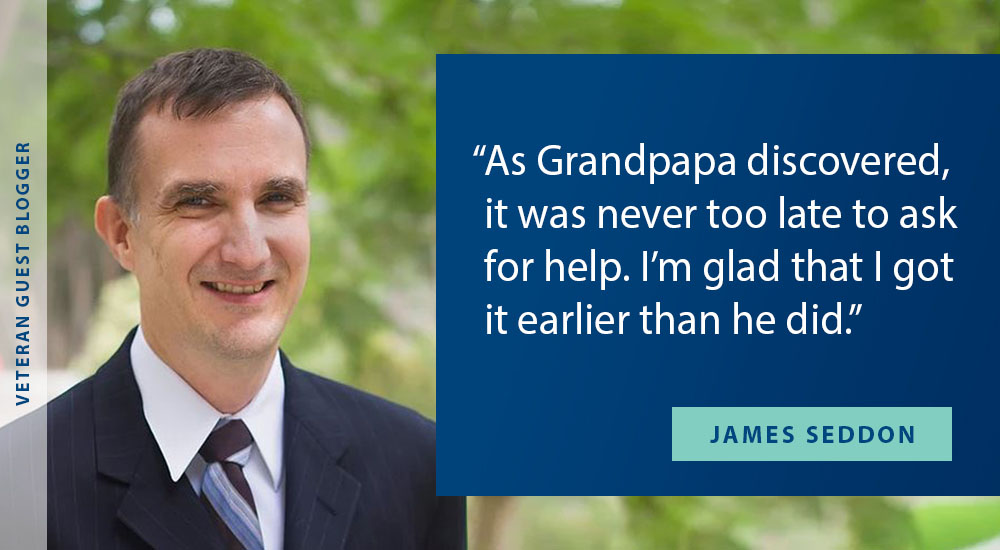My grandfather served in World War II. My mother would say the Nazis succeeded in destroying him even though he returned home.
Looking back on her childhood, my mother couldn’t believe her father was the softhearted man who wrote her mother such sweet love letters before the war.
My mother instead remembered her father as domineering, with a quick and extreme temper. Outbursts were common and feared. He was paranoid and constantly in fear that people were plotting to trespass and rob him blind. He was well-armed and family members worried he would eventually accidentally shoot a neighbor.
He was nicer to me, his grandson, though we were not close. I never thought we had much in common until after my own wartime service.
A grandfather opens up about trauma
Only in the last few years of his life did he begin to open up about the traumatic events he experienced in Europe, saying he “fought the war every single night.” The family finally learned about some of the terrors he endured, stories that we had never heard before.
Given his own misconceptions about masculinity and bravery, he never talked about his reactions to these events until the end of his life. He may have wrongly believed that any symptoms meant he was a coward, weak, or – worst of all – crazy. In his mind, “real men” just coped with such things or never felt them to begin with.
Shortly before he died, he finally told his doctor about his insomnia, his intrusive memories, his feelings about losing control, and the doctor, unsurprisingly, diagnosed him with PTSD. Grandpapa didn’t seek treatment for it. Still, he said that the mere diagnosis was a huge relief.
It was not his fault, the doctor had said. He was not crazy, weak or cowardly. I wonder what his life could have been had he gotten diagnosed and treated earlier. Even with just that diagnosis, he had more peace than we had ever known him to have. He died not long after.
Another generation goes to war
A year after he died, I deployed to Afghanistan. When I returned, I knew – deep down – that I was not the same man who had left home. My temper was far worse. My family walked on eggshells around me. Hyperaware, I startled very easily.
I would get anxious for no good reason. Nightmares visited me. Intrusive memories interfered with concentration at work.
The demobilization process flagged me for PTSD follow-up, diagnosed me, and recommended treatment, an improvement over Grandpapa’s time. I had trouble accepting the diagnosis. Like my grandfather, I was convinced that I could – that I should – just cope with these symptoms on my own. That I shouldn’t even be having them because others had far harder deployments than mine. Besides, I was skeptical that talking to anyone would make any difference.
I was lucky that my smart and strong wife insisted that I seek help. I don’t know if I would have decided on my own to accept treatment. She could see the truth: My symptoms were getting worse over time, not better.
How bad would they be years down the road?
A grandson seeks and finds healing
My VA therapist listened to my skepticism but was convinced she could help me. Her confidence in the outcome, if I followed the program, kept me going. During my treatment, I mentioned my grandfather. She said she wished she could have treated him.
One of her other patients was a Vietnam Veteran dealing with trauma that happened 40 years prior. “This stuff works,” she told me. “And it doesn’t matter how much time has passed.”
I believed her. She was right about many things, including that treatment would help me. My grandfather and I were on similarly bad trajectories when we returned home from our wars. I count myself lucky to have benefited from improvements in screening and treatment and to have had someone in my life who could convince me to get help. As Grandpapa discovered, it was never too late to ask for help. I’m glad that I got it earlier than he did.
Find ways to help a Veteran in crisis and prevent Veteran suicide at BeThereForVeterans.com. If you’re going through a tough time and need support, the Veterans Crisis Line is available anytime, day or night.
You can even call if you’re concerned about a fellow Veteran. Call 1-800-273-8255 and Press 1, chat online, or text 838255.
James Seddon is a retired naval officer with 21 years of service and multiple deployments to combat zones. He has published memoirs and opinion pieces in the LA Times, Task and Purpose, and On Patrol, the magazine of the USO. He received care at La Jolla Hospital’s post-9/11 PTSD clinic in 2010 and 2011. Since 2005, he has been associate director of network and voice operations for a university.
Topics in this story
More Stories
Veteran Byron Potier weighed almost 300 pounds and was tired and lethargic. He was the perfect candidate for gastric sleeve surgery.
How much do you know about VA care, benefits and services? Don’t miss out on what you've earned—check out the "2025 VA Federal Benefits Guide for Veterans, Dependents, Survivors, and Caregivers" handbook to learn more.
Feeling stressed? Your breath can help you relax and focus. Take 3 minutes to reset and prioritize your well being for this week's #LiveWholeHealth practice.






